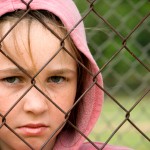Why don’t children tell?
 Children often don’t know how to tell—what words to use.
Children often don’t know how to tell—what words to use.- Children may not understand that what happens is abuse.
- Children think that no one will believe their story. Often they are told this by their abuser. Children have an exceptionally difficult time thinking that anyone will believe their story, especially if the abuser is a member of the family.
- Children are often threatened by the abuser. They may be told that if they tell anyone the abuser will kill or harm them, a parent,a younger brother or sister or pet. Young children are not capable of rationalizing such a threat, so very often they live in fear.
- Children are often bribed into not telling. They are often promised gifts or granted privileges other siblings won’t receive. This happens most often when the offender is a close relative.
- Children are often convinced that the abuse is punishment for something they have done wrong. Abusers will often remind children that they are bad.
- Children blame themselves. Children often feel they shouldn’t have gone somewhere or allowed themselves to be with a particular person. Children blame themselves for being disobedient.
- Children are usually dependent on the abuser either emotionally or financially. They fear I they tell they will lose what they have.
- Children often fear that if they tell they will be held responsible for the break-up of the family, or for any problems that arise following disclosure.
- Children often don’t tell because they don’t know whom to tell. They aren’t aware of their support systems and resources.